Hear Policymakers’ Perspective on the 2023 Texas Legislative Session

The 88th Texas Legislature convenes on Jan. 10, 2023, and United Way of Metropolitan Dallas is gearing up for a busy 140 days of advocacy. To prepare for this important time, on Thursday, Dec. 1, we hosted our annual Lunch with Legislators event, where local policymakers discussed some of the most important legislative topics that impact our region in the areas of education, income and health.
This year our panel included Sen. Nathan Johnson, Rep. Matt Shaheen and Rep. Carl Sherman, Sr., who came together to discuss the legislature’s likely priorities for the 2023 session, including issues such as the state’s electricity grid, teacher retention, mental health, Medicaid expansion, public education, the foster care system and more.
Our moderator was Sonal Shah, interim executive vice president at United Way Worldwide and incoming CEO of the Texas Tribune. The event was graciously presented by Haynes and Boone, LLP.
View the full event here:
Read on for highlights of their Q&A:
Sonal Shah: Rep. Shaheen, what are the priorities going to be for Gov. Abbott and Lt. Gov. Patrick and the Republican party this session?
Rep. Shaheen: We’ve got some significant issues that we’ll deal with. One will be the grid…Some of the other items will be infrastructure related. There’s about 100 people that move to North Texas every day, and they all have cars and they’re all thirsty. So we need reservoirs, roads, those types of things. Another item is education: It’s always a big focus. We have a lot of children throughout the state that have this really bad learning gap [after] learning virtually for the past two years. The communities where that gap is most prominent are our fastest growing communities in the state of Texas. That’s something we should all be losing sleep over, because that’s our future workforce. And our workforce is one of the reasons why we are so successful in the state of Texas. So God bless our teachers, our principals, our board members. This has been a tough two years for them, but they’ve really shined. But we have our work cut out for us.
Shah: Sen. Johnson, what do you see as some of the priorities coming up in the session for the Democratic Party?
Sen. Johnson: The grid is a bipartisan effort…and it’s going to be a top priority for everybody. It affects every business, every family, every household. We will also be working on infrastructure. I want to emphasize, however, that in addition to roads, airports, water systems, we also look at social infrastructure, and it echoes what Matt just said. Education is part of infrastructure—it’s our social infrastructure. Healthcare is infrastructure. These are the fundamental systems that have to be in place, that have to be effective, that have to be well run and well funded in order for our society to grow and for anyone to actually want to be here. Those things I think have been neglected. And the final thing that I think really ought to be a serious emphasis is government itself. We have agencies that have been systematically cut for a decade. I understand that we’re in lean times, and cuts have to be made. But we somehow develop this philosophy that if we make governments smaller and smaller, the better off we’ll be. And what we’re finding out is that our state agencies are unable to meet the needs of businesses and people who rely on them. Health and human services cannot keep employees. The Texas Juvenile Justice Department, foster care and the Department of Family Protective Services, they can’t run on less money.
Shah: Rep. Sherman, you’ve been a mayor. Now you’re in the state house. What are your priorities?
Rep. Sherman: There’s so much missing in our democracy: civility, concern. When you look at the [state’s] $27 billion surplus and $13 billion that’s in the rainy-day fund, and you look at all the needs that we have, and you think about our Judeo-Christian foundation, there’s a cognitive dissonance between what we do and our policies with all of the areas of concern that Sen. Johnson was talking about. It’s not a matter of whether we have the resources; it’s a matter of whether we have leaders who have the courage to actually fulfill what we say we’re driven by. And that is, for me, our Lord savior Jesus Christ. When you think about where we are allocating our resources, every time Texas is blessed with more, we do less for those who need it most…We’ve got to really have more of a conscience about being blessed with so much. We have over 1,100 people moving to Texas every day. Yes, we need to make sure that our infrastructure is there, and we will, but we’ve got to fix this democracy issue…that trust issue. There’s a reason folks don’t trust us. Because when we decide districts, we pick who our voters are going to be. If you’re in Illinois and you are a Republican, Lord help you. If you’re a Democrat in Texas, Lord help you. But most of all, Lord help the people, because it’s all partisan politics. And when we come into this next session, when you have a one-party rule, that’s not good.
Shah: Sen. Johnson, let’s go back to healthcare. U.S. News & World Report recognizes Texas as No. 9 in the economy and No. 31 on healthcare. There are persistent problems with our foster care system, with access to mental healthcare. What more can and should the state be doing to address these issues? And is there an appetite to expand Medicaid or create a Texas solution?
Sen. Johnson: In my view, it’s absolutely unequivocal that Texas should expand Medicaid. Thirty-nine states have done it. We’ve now seen North Carolina and Kansas both moving toward it. We just saw South Dakota with a referendum. We don’t have a referendum in Texas. We could pull in an extra $2 billion in state revenue and extra $2.5 billion in local revenue, all without a tax, and have people be healthier, reduce family bankruptcies, improve overall health and stabilize rural health systems. I know there’s a lot of people on the other side of the aisle who still have grave concerns about it. Do I think it’s going to pass this session? We have to have leadership get comfortable with it. And I don’t know if they are yet. They’ve been fairly quiet. I’ll continue to advocate for it. I expect Republicans and Democrats both to try to increase access to healthcare through smaller, vastly less effective means where we have a 60-40 governmental match instead of a 90-10. And I will support them because they’re good things to do, but they’re small, and we just need to improve overall how we do this. By the way, our state-administered Medicaid program is one of the nation’s best. It’s doing very, very well. It’s one of the most cost-efficient systems in the entire nation. And the conservatives were worried, rightly so initially, that Medicaid expansion would be a gigantic suck of money. But as it turns out, a Republican-led legislature has done a very good job of working with health systems to become more efficient. So I think it could be a politically safe time for everybody, irrespective of their ideology, to embrace Medicaid expansion and other systems. On the subject of mental healthcare, we do have some victories. Last legislative session, we had overwhelming support for a state mental health hospital in the Dallas area. We need to make sure we continue to support that. Given the overall bipartisan emphasis on mental health, it shouldn’t be a problem to continue the financial support that we need for the state mental health hospital…We as legislators look to experts in the community to help us craft the legislation that will improve Texas’ rather abysmal standing in mental health. And it is greatly needed right now.
Shah: Rep. Shaheen, do you see this legislative session looking at investing more in terms of mental health?
Sen. Shaheen: I think it’s appropriate to say that the state of Texas probably historically has been behind in the mental health area. But really since I’ve been here, at least the past eight years, we’ve been playing catch-up. One session alone, we appropriated about $500 million just to upgrade our facilities. If you look at the state budget and you look at all healthcare components, whether it’s mental health, Medicaid, we’re talking about $85 billion. It’s a significant amount of dollars. So the thing that we’ve been trying to do as a legislative body, is how do we most effectively deliver healthcare mental health across the state of Texas? From a mental health perspective, I think what you’re going to see this session is some additional funding, but we’ve got to figure out the most effective way to deliver that funding. A lot of it is going to be with our schools. And so how do our schools work with the mental health entity?
Shah: Rep. Sherman, another big chunk of the state budget is education. What do you see as some of the big issues coming in this session on education?
Rep. Sherman: I think we have to start with our teachers. Supporting our teachers is paramount to providing a premier education experience for our students. I believe we have to start with our retired teachers, so people understand that we actually do value educators. If I am looking at a career, I’m not looking at teaching because when a person who’s taught for 20, 30 years in our system [retires], they’re on their own and they’re not getting social security. We have to somehow have the courage to provide the resources needed for our teachers. I think that’s first and foremost, with more than 5 million students in our public education system. We’ve got to stop with the interest of defunding public education. And we should commit to supporting the teachers. Last year, 370,000 plus teachers were a part of education, and we had about 8,600 leave. We need to know why they’re leaving other than retiring. We have to focus on that career and ensure that we are rewarding them according to what we are saying.
Get Ready for the 2023 Legislative Session
The start of the 88th Texas Legislature is just weeks away, marking an important time for advocacy at United Way. We invite you to join us as we speak up and speak out for policies that will improve education, income and health; expand opportunities for our neighbors; and drive systemic change.
Here are a few ways to get ready for the session so you can ensure your voice is heard:
- Sign up for our Advocacy Alerts. We’ll let you know the best times during the 2023 session to contact your representatives about key issues around education, income and health.
- Know who represents you. Texas has new political maps for the state’s congressional, House, Senate and Board of Education districts. Click here to find your new districts and representatives.
- Learn more about our approach to advocacy in our blog article, How and Why We Advocate for the North Texas Community.
- Take a deeper dive into some of the key issues in this session. View our All Eyes on Austin event series, which explored important topics in education, income and health.
- Save the date to join us for United Way Day at the Capitol on March 1, 2023
Tags

Join the Movement
Lasting change only happens when we work together, and part of that means contacting public officials at a state and local level. At United Way of Metropolitan Dallas, we invite you to join us in advocating for improvements in the areas of education, income and health. Click below to sign up to receive our Advocacy Alerts.


